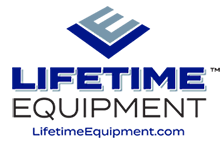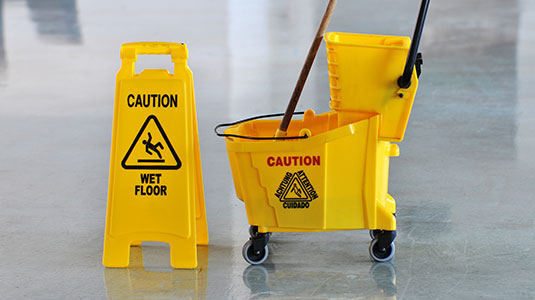They’re dramatically faster than mop-and-bucket cleaning. In addition, new walk-behind and ride-on floor scrubbers are much easier and more efficient to use than even the automatic floor scrubbers of a decade ago — and the new generation of robotic floor scrubbers take that efficiency to an entirely new level. But that doesn’t mean there’s no work involved in cleaning your floors. One of the biggest keys to maximizing efficiency and performance in your floor cleaning program is making sure you’re correctly preparing your floors for scrubbing.
Here are five simple best practices to follow before using your automatic floor scrubbing machine:
1. Remove Mats
Mats are a great way to keep floors cleaner and reduce the dust, dirt and debris tracked in. Make sure you roll up and remove all mats before cleaning your floors with your automatic scrubber.
WHY IT MATTERS: Most automatic floor scrubbers are designed to work on hard flooring substrates, not carpet mats or even rubber mats. This means the automatic scrubber won’t pull the dirt out of mats; mats can easily be removed and washed (that’s the whole point!). An automatic scrubber could also get caught on the edges of a mat, potentially damaging the mat or the machine.
2. Pre-Sweep the Floor
You probably think to pick up large debris before scrubbing, but best practice is always to pre-sweep to remove all dirt and dust from your cleaning path. Even if visible dirt isn’t apparent, a layer of dust accumulates on most floors within hours.
WHY IT MATTERS: Automatic scrubbers provide powerful cleaning power, but they also protect and enhance your floor’s finish. Scrubbing a dirty, dusty floor can cause a number of unwanted problems. The scrubber may turn large amounts of dirt into mud and spread it around the floors, ultimately requiring multiple passes to get the floor clean. Small pebbles, rocks and other debris could get dragged around and potentially ground into the floor, damaging the finish. Dirt and debris can also cause additional or accelerated wear and tear on the brush, pad driver, and other cleaning machine parts.
3. Scrape Off Sticky Substances
A bit of a supplement to #2: Make sure you take the time to notice and scrape off any sticky substances, like chewing gum or dried food, before using your automatic floor scrubber.
WHY IT MATTERS: Again, modern automatic floor scrubbers deliver powerful cleaning, but they aren’t designed to remove absolutely anything and everything from your floors. At best, sticky residues may just stubbornly resist scrubbing, remaining on your floors. But sticky residue may also be spread around by the scrubber — or could lead to streaking from the squeegee.
4. Clear Obstacles
Move any obstacles, like rolling shelves or displays, out of your cleaning path. Move furniture, if possible, as well.
WHY IT MATTERS: You want to make sure you’re cleaning the entire floor space — not leaving dust and dirt around the edges of large or awkward obstacles. You also want to maximize the efficiency of your cleaning path instead of having to navigate around a complicated course full of obstacles.
5. Post Warning/Caution Signs
Safety always comes first: Don’t forget to post warning/caution/wet floor signs prominently to ensure that employees, customers and other facility visitors are aware that floor cleaning is in progress. Make sure you place signs in highly visible locations, at entrances to the area(s) where floor cleaning is happening.
WHY IT MATTERS: Slip-and-fall incidents are a top cause of workplace injury, so you want to be extra cautious in ensuring that people are aware of potentially wet floors immediately following floor scrubbing.
Preparation Pays Off
As with most things in work and life, taking a little extra time to prepare on the front end can yield significant dividends on the back end. Following these five simple best practices for preparing your floors before using your automatic scrubbing machine can help you protect and keep your floors shining longer while also protecting your investment in your cleaning equipment. But just as significantly, doing a little work beforehand can boost your cleaning and labor efficiency — allowing you to consistently achieve the clean, shining floors you want in the least amount of time.

